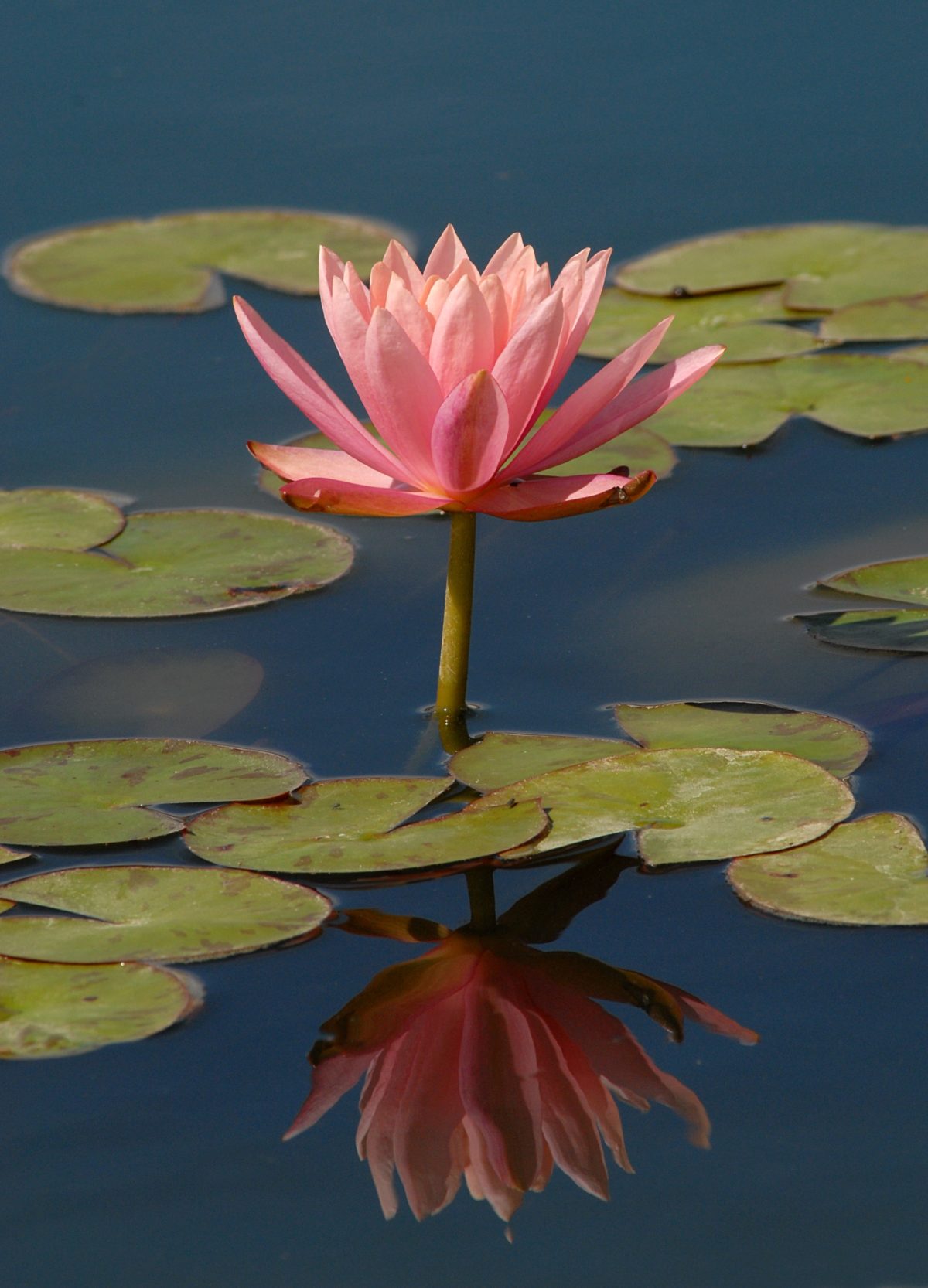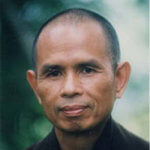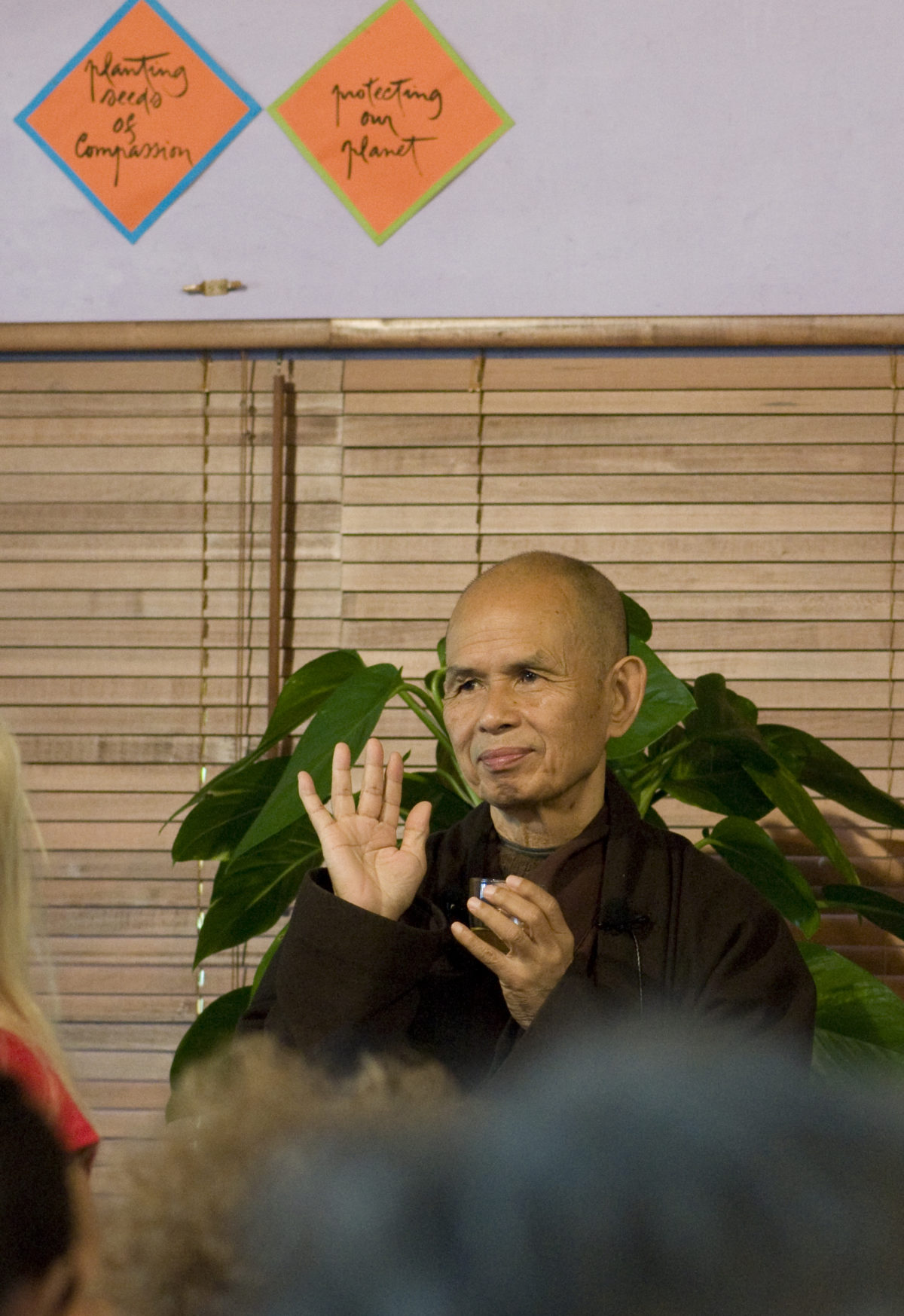
Plum Village Upper Hamlet
December 26, 2010
Every one of us is trying to find our true home. We know that our true home is inside, and with the energy of mindfulness, we can go back to our true home in the here and the now. Sangha is our true home.
In Vietnamese, the husband calls the wife “my home.” And the wife calls the husband her home.

Plum Village Upper Hamlet
December 26, 2010
Every one of us is trying to find our true home. We know that our true home is inside, and with the energy of mindfulness, we can go back to our true home in the here and the now. Sangha is our true home.
In Vietnamese, the husband calls the wife “my home.” And the wife calls the husband her home. Nha toi means my house, my home. When a gentleman is asked “Where is your wife?” he will say, “My home is now at the post office.” And if a guest said to the wife, “Your home is beautiful; who decorated it?” she would answer, “It’s my home who decorated it,” meaning, “my husband.” When the husband calls his wife, he says, “Nha oi,” my home. And she says, “Here I am.” Nha oi. Nha toi.
When you are in such a relationship, the other person is your true home. And you should be a true home for him or for her. First you need to be your own true home so that you can be the home of your beloved. We should practice so we can be a true home for ourselves and for the one that we love. How? We need the practice of mindfulness.
In Plum Village, every time you hear the bell, you stop thinking, you stop talking, you stop doing things. You pay attention to your in-breath as you breathe in and you say, “I listen, I listen. This wonderful sound brings me back to my true home.” My true home is inside. My true home is in the here and the now. So practicing going home is what we do all day long, because we are only comfortable in our true home. Our true home is available, and we can go home every moment. Our home should be safe, intimate, and cozy, and it is we who make it that way.
Last week I had tea with a couple who came from the United Kingdom. They spent two weeks in Plum Village, with the monks in the Upper Hamlet. The lady said, “It’s strange. It’s the first time that I’ve lived in a place where there are hundreds of men and no women, and I feel very safe in the Upper Hamlet. I have never felt safe like that.” In the Upper Hamlet she was the only woman, and she felt very safe. And if she feels safe, the place is her home, because home should provide that kind of safety. Are you a safe place for him or for her? Do you have enough stability, strength, protection for the one you love?
And the gentleman said, “The last two weeks may be the best weeks of my life.” That is because of the work of Sangha building. When you build a Sangha, you build a home for yourself. And in that place, you feel at home, you feel at ease, you feel safe. If you don’t feel safe within yourself, you are not a home for your own self, and you cannot provide your loved one a home. That is why it’s very important to go back to yourself and make it safe for you and for the ones you love.
If you feel lonely, if you feel cut off, if you suffer, if you need healing, you cannot expect to heal by having a sexual relationship with another person. That cannot heal you. You will create more suffering for him, for her, and for yourself. In the Third Mindfulness Training, we learn that sexual desire is not love. And without love, sexual activities can only bring suffering to you and to the other person. Loneliness cannot be dissipated by sexual activity; you cannot heal yourself by having sex. You have to learn how to heal yourself, to be comfortable within, and then you begin to create a home. Then you have something to offer to the other person. The other person also has to heal, so that she will feel at ease, and she can become your home. Otherwise, what she has to share is only her loneliness, her sickness, her suffering. That cannot help heal you at all.

Three Kinds of Intimacy
There are three kinds of intimacy. The first one is physical and sexual. The second is emotional. And the third one is spiritual. Sexual intimacy cannot be separated from emotional intimacy. They go together. And if spiritual intimacy is there, the physical, sexual intimacy will have meaning and will be healthy and healing. Otherwise it will be destructive.
Every one of us is seeking emotional intimacy. We want to have real communication, mutual understanding, communion. In the light of Buddhist practice, you have to listen to your own suffering. There is suffering inside of you, and there is suffering inside of the other person. If you do not listen to your own suffering, you will not understand it, and you will not have compassion for yourself; and compassion is the element that helps you heal.
The first thing the Buddha talked about is the suffering inside. Many of us are fearful. We don’t want to go back to ourselves, because we believe that we will encounter the block of suffering inside, and that we will be overwhelmed. Instead, we try to cover it up by means of consumption. We consume food, we consume music, we consume many other things, and we consume sex. But that does not help. That is why the Buddha proposed that we go home to ourselves with courage, in order to recognize and listen deeply to the suffering inside. We can use the energy of mindfulness, generated by conscious breathing and walking, to embrace it tenderly. “My suffering, I know you are there. I am home. And I will take care of you.”
There are times when we suffer but we don’t know the nature of the suffering. Our ancestors, our parents may not have been able to transform their suffering, and they have transmitted it to us. And now, because we have encountered the Buddhadharma, we have a chance to recognize it, embrace it, and transform it for ourselves and our ancestors, our parents. “Dear ancestors, dear father, dear mother, I have received this block of suffering from you. I know the Dharma, I know the practice. I will learn to recognize this block of suffering that has been transmitted to me, and with love I will try to accept and to transform it.” You can do it out of love. You do it for your parents, for your ancestors, because we are our ancestors.
According to the teaching of the Four Noble Truths, unless you listen to your suffering, unless you look deeply into your suffering, and embrace it tenderly with your energy of mindfulness, you cannot understand the roots of your suffering. When you begin to understand the roots of your suffering, suddenly the energy of compassion, of understanding, arises. And understanding and compassion have the power to heal. By embracing and listening to your suffering, you bring about understanding and compassion. And when the nectar of compassion is born in you, you suffer less, you feel less lonely. You begin to feel the warmth within yourself; you are building a home inside yourself. The Buddha recommends that we build a home inside, an island within ourselves. Be an island unto yourself. You’ll feel comfortable, you’ll feel warm, and you can be a refuge for the other person too.
When you have understood your own suffering, your own loneliness, you feel lighter and you can listen to the suffering of the other person. Your suffering carries within itself the suffering of your ancestors, of the world, of society. Interbeing means that my suffering is in your suffering, and your suffering is in my suffering. That is why, when I have understood my suffering, it is easier for me to understand your suffering. When you understand someone’s suffering, that is a great gift that you can offer to him or to her. The other person feels for the first time that she is understood. To offer understanding means to offer love. And understanding another person is not possible without understanding self. Home-building begins with yourself. Your partner too builds a home within, and then you can call her your home, and she can call you her home.
In the Upper Hamlet, we build a Sangha as our home. You build your family as a Sangha too, because Sangha means simply “community.” The most noble task is to build a Sangha. After enlightenment, the first thing the Buddha taught us was to look for elements to build a Sangha. A Sangha is a refuge for ourselves and for many people.
So we go home to ourselves, we listen to the suffering inside of us. We embrace our pain, our sorrow, our loneliness with the energy of mindfulness. And that kind of understanding, that kind of insight will help transform the suffering inside us. We feel lighter, we begin to feel warmth and peace inside. And then when the other person joins you in building home, you have an ally. You are helping him and he is helping you. And together you have home. You have home in yourself, you have home in him, in her also. If that kind of intimacy does not exist, then a sexual relationship can cause a lot of damage. That is why earlier I said that physical, sexual intimacy cannot be separated from emotional intimacy.
Between the spiritual and the emotional there is a link. Spirituality is not just a belief in a teaching; it is a practice. And the practice always brings relief, communication, transformation. Everyone needs a spiritual dimension in his or her life. Without a spiritual dimension in our life, we cannot deal with the difficulties that we encounter. We should have a spiritual practice, a Dharma life. We learn how to put the Dharma into practice. With that kind of practice, we can deal with the difficulties we encounter in our daily life.
Your spiritual practice can help you a lot in dealing with your emotions, helping you to listen, to embrace your own suffering, and to recognize and embrace the suffering of the other person. That is why these two forms of intimacy inter-are. You know how to deal with a strong emotion, like fear, anger, despair. Because you know how to do that, you can feel more peaceful within yourself. That spiritual practice helps you build a home within yourself, for your sake and for the sake of the other person. That is why emotional intimacy cannot be separated from spiritual intimacy. The three kinds of intimacy inter-are.
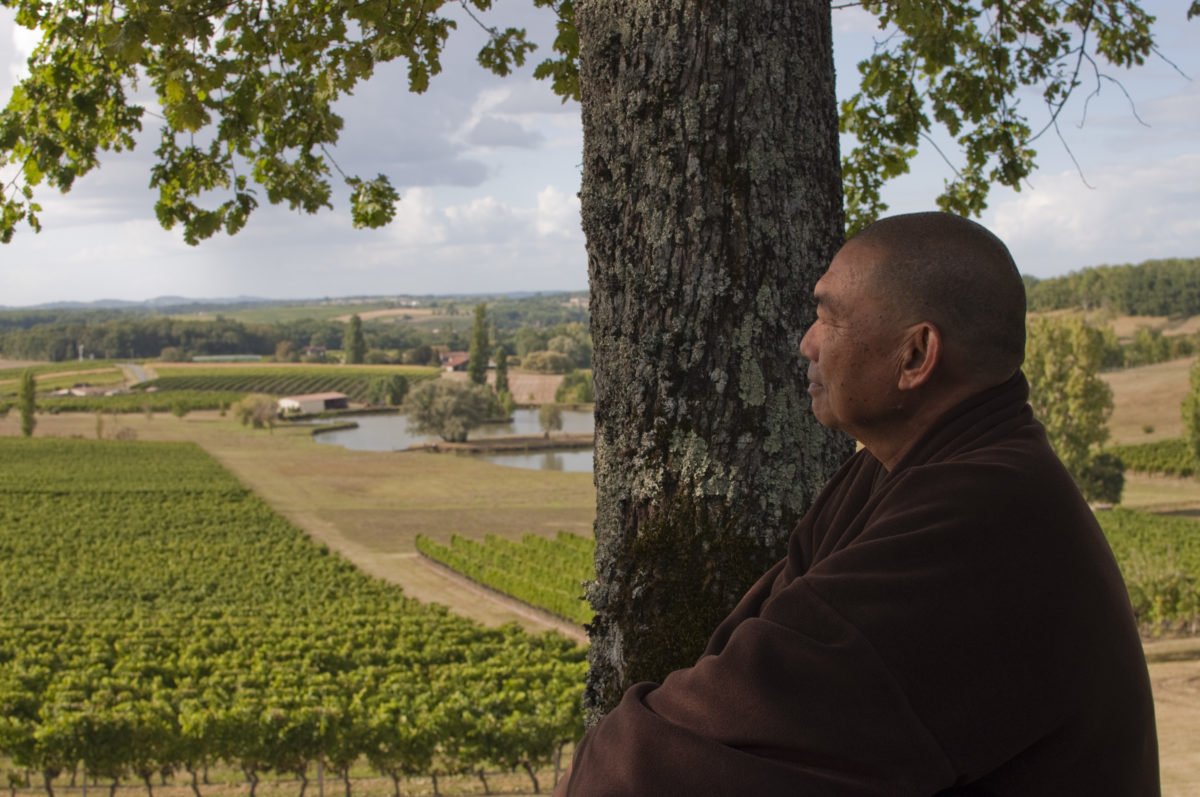
Reverence for the Body
Sexual activity without love is empty sex. It is prevalent in our society and is causing a lot of suffering for our young people. If you are schoolteachers, if you are parents, you should help your children and your students to avoid empty sex. Empty sex is bringing a lot of damage to their minds and their bodies. Damage will emerge later on in the forms of depression, mental disorders, suicide. Many young people don’t see the connection between empty sex and these physical and mental disorders in themselves.
What happens in the body will have an effect on the mind and vice versa. Mind relies on the body to manifest and body relies on mind to be alive, to be possible. When you love someone, you have to respect not only her mind but also her body. You respect your own body, and you respect his body. True love should have the nature of reverence, respect. In the Asian tradition you have to treat your spouse with respect, like a guest. And in order to respect her, you have to respect yourself first. Reverence should be the nature of our love.
In my country, parents are proud to introduce their child to a guest. The guest will usually ask, “Do you love your father, your mother?” The child says, “Yes! I love my father, I love my mother.” The next question is: “Where do you put your love?” The child has been instructed to answer: “My love, I put it on my head.” Not “in my heart,” but “on my head.” When a monk is about to put on his sanghati, the saffron robe, for a ceremony, he’s holding his sanghati with reverence, the same as when handling a scripture. If you approach the monk and you bow to him, and if he does not find any decent place to put his sanghati, he will put it on his head because this is a noble place; it is like the altar. That is why in Vietnamese good manners, you should not touch the head of another person if you don’t know him or her well. This is one of the sacred places of the body, because the head is the altar to worship ancestors and the Buddha.
There are other parts of the body that are also sacred that you should not touch. It’s like inside the Imperial City, there is the Purple City* where the family of the king lives. And you are not supposed to go in that area. If you do, they will arrest you and cut off your head. In a person’s body there are areas that are forbidden to touch. And if you don’t show respect, if you touch that part of the body, you are penetrating the Purple City. When a child is sexually abused, she suffers, he suffers very deeply. Someone has violated her Purple City and she did not have the ability to protect herself. There are children who have been abused at the age of eight, nine, ten, and they suffer very deeply. They blame their parents for not having protected them, and their relationship with their parents becomes difficult. Then their relationship with their friends and their future lovers will also be very difficult. The wounds are always there.
Sexual abuse of children is overwhelming. It is said that in the U.S. from five to fifteen percent of young boys are abused sexually and from fifteen to thirty-five percent of little girls are abused sexually. That’s a lot. And when a child is abused like that, she or he will suffer all her life from many things, because her body hasn’t been respected.
In school, and in the family, we need to teach them to respect themselves, to respect their own body, and to respect the body of the other person. If you are religious leaders, if you are politicians, if you are parents or teachers, if you are educators, please think about it. We can learn from the teaching of the Buddha to organize our life in the family, in the school, in society in such a way that we can be protected and our child will be always protected.
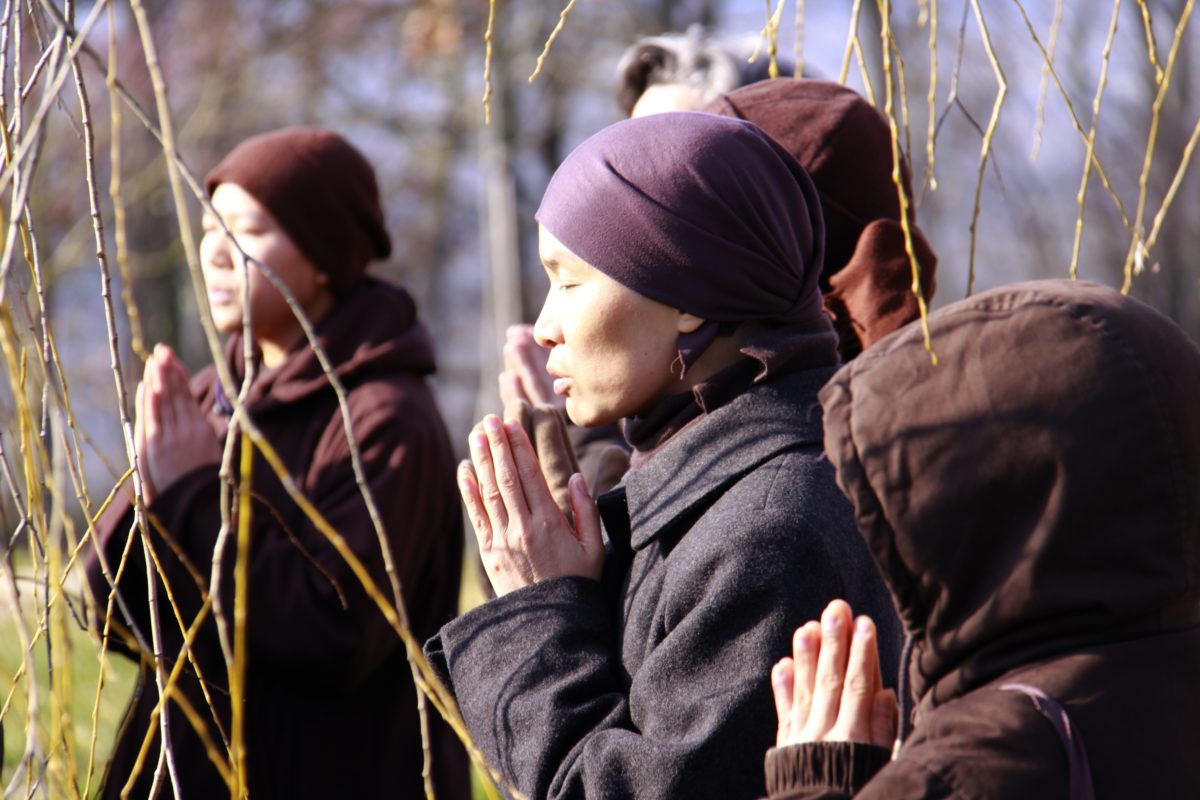
Be Beautiful, Be Yourself
We said earlier that sensual pleasure, sexual desire, is not love, but our society is organized in such a way that sensual pleasure becomes the most important thing. To sell their products, corporations create advertisements that water the seeds of craving in you. They want you to consume so that you will develop a craving for sensual pleasure. But sensual pleasures can destroy you. What we need is mutual understanding, trust, love, emotional intimacy, spiritual intimacy. But we don’t have the opportunity to meet that kind of deep need in us.
There are women’s fashion magazines that tell us that in order to succeed, you have to look a certain way, and use a certain product. Many young people in our society want to have cosmetic surgery in order to meet that standard of beauty. They suffer very much, because they cannot accept their bodies. When you do not accept your body as it is, you are not your true home. Every child is born in the garden of humanity as a flower. Your body is a kind of flower, and flowers differ from one another. Breathing in, I see myself as a flower. Breathing out, I feel fresh. If you can accept your body, then you have a chance to see your body as home. If you don’t accept your body, you cannot have a home. If you cannot accept your mind, you cannot be a home to yourself. And there are many young people who do not accept their body, who do not accept who they are; they want to be someone else. We have to tell young people they are already beautiful as they are; they don’t have to be another person.
Thay has a calligraphy: “Be beautiful; be yourself.” That is a very important practice. You have to accept yourself as you are. And when you practice building a home in yourself, you’ll become more and more beautiful. You have peace, you have warmth, you have joy. You feel wonderful within yourself. And people will recognize the beauty of your flower.
Mindfulness is the kind of energy that can help you to go home to yourself, to be in the here and the now, so that you know what to do and what not to do, in order to preserve yourself, in order to build your true home, in order to transform your own afflictions, and to be a home for other people. The Five Mindfulness Trainings are a concrete way of practicing mindfulness. In the Buddhist tradition, holiness is made of mindfulness. And mindfulness brings within itself the energy of concentration and insight. Mindfulness, concentration, and insight make you holy.
Holiness does not exist only with celibacy. There are those who are celibate but who are not holy, because they don’t have enough mindfulness, concentration, and insight. There are those who live a conjugal life, but if they have mindfulness and concentration and insight, they have the element of holiness in them. Sexual intimacy can be a beautiful thing if there is mindfulness, concentration, insight, mutual understanding, and love. Otherwise it will be very destructive. A sutra describes the moment when Queen Mahamaya was pregnant with the Buddha. Mahamaya dreamed of a white elephant whose trunk was holding a lotus flower. The elephant touched her with the lotus flower and entered into her very, very softly, and she was pregnant with Siddhartha. That is the way they describe a sexual relationship, in the palace before Siddhartha was conceived: gentleness, beauty. Sexual intimacy should not occur before there is communion, understanding, sharing on the emotional and spiritual level. And then the physical, sexual intimacy can also become holy.
To practice Buddhism as a monk is always easier than to practice as a layperson. There is a Vietnamese saying: to practice as a monk is easiest; to practice as a layperson is much more difficult. So to refrain from all sexual activities is much easier than to have a sexual relationship. To have a sexual relationship in the context of mutual understanding and love, you need a lot of practice. Otherwise you create suffering for him, for you, for her.
There is a woman doctor in Switzerland who came to practice in Plum Village. She had suffered several times because of relationships. Since she was young, every time she was asked to have a sexual relationship with a man, she felt she had to say yes even if she did not feel ready, because she was afraid. Many teenagers in our time feel that way. They don’t like it, they don’t want it, they don’t feel ready for it, but they do not dare to say no, because they are afraid to be looked upon as weird, as abnormal. They don’t want to be rejected; they want to be accepted. That is a psychological fact parents and teachers have to be aware of. We have to tell the young people that they can learn to say no when they are not ready, when they are afraid. Otherwise they will destroy their body and their mind. Please listen to the young people, be compassionate, help them. We have to help them find skillful ways to say no.
When she came to Plum Village, the woman from Switzerland learned skillful ways to say no. In her last relationship, she was able to say no. She said, “I need you, my beloved. We need to understand each other. I need your presence. I need someone to help me when I have difficulties, to understand me.” They spent one year and a half together without having a sexual relationship. And when we went to her country for a Dharma talk, she proudly introduced her husband to us. Their relationship was wonderful, very successful, because she was able to say no until she was ready, and together they could build the kind of relationship that is lasting.
